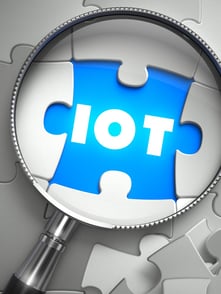The Digital Transformation Outcomes for Internet of Things (IoT)
Be smart!
Aren’t you hearing more often about this Internet of Things’ concept? What does it exactly mean and why should it be a subject of interest for manufacturers? Discover the possibilities of the Internet of Things for manufacturers in the whitepaper Internet of Things - Manufacturing.
In a nutshell, Internet of Things (IoT) describes the ecosystem in which objects embedded with sensors are connected to the Internet. These smart objects can then interact between themselves and/or with people. Did you know that in 2008, there were already more objects connected to the Internet than people? (Sources: Forbes).
IoT is now increasingly and massively used in the manufacturing field for its broad range of outstanding benefits, be it for customers, employees or operations. Indeed, manufacturing businesses have observed major improvements in their operation’s efficiency and productivity by using this new kind of technology. It is undoubtedly the future of manufacturing, as three quarters of companies are either actively exploring the Internet of Things or already using it. It changes business models, drive down costs, automate processes and so on.

As such, let’s discuss the core outcomes of this Fourth Industrial Revolution:
-
Engage your customers
Business models are moving from an asset-centric transaction to a service-centric relationship model. This means you do not only sell a product to your customers, but a range of related services as well. By delivering connected and personalized experiences, you increase their satisfaction. Wouldn’t it be fantastic to buy an alarm clock able to wake you up and, at the same time, notify your coffee maker to start brewing your espresso?
Thus, thanks to the data gathered, manufacturers can anticipate customer needs, innovate quickly and tailor their service interactions. The constant availability of data also enables manufacturers to better serve their clients. -
Empower Your Employees
Slowly but surely, baby boomers will be replaced by the Millennial generation. Comfortable with new technologies, millennials wish to work in a digital workplace, where they can use familiar tools, which improve their engagement and creativity. They will then feel more efficient as they have real-time visibility on the supply chain, providing insight and leading to better decision-making.
Employees can benefit in several ways from real-time access to large data. Not only does it facilitate their collaboration among them, but data can sometimes prove that an employee didn’t perform its task due to a machine problem, for example.
Plus, IoT enhance workers’ safety. Indeed, sensors in many products are helpful tools which enables, among others, health monitoring, smart ventilation and air quality management, smart environmental measurement, smart measurement of presence/levels of liquids, gases, radiation and dangerous materials, risk measurement, etc.
Who wouldn’t prefer working in a safer environment, equipped with modern tools to make work easier? -
Optimize your operations
As previously said, data is the core added value while using smart sensors. This data provides analytics, which offer several insights on your business. It improves, among others, your operations’ efficiency by providing updates regarding any mechanical wear or potential problems. Your sensors are constantly monitoring your machines’ quality and statuses by ensuring automatic controls. As a result, it becomes less necessary to interrupt the production’s process to ensure quality control, because machines can predict breakdowns. Intelligent sensors then enable continuous production, which reduces costs and delays.
Moreover, IoT allows you to use lean production methods in the manufacturing space. Indeed, production flow monitoring eliminates waste and avoid unnecessary work. Using smart sensors can also help manufacturers to remotely manage operations. As an example, an equipment manufacturer in Germany, whose products are being used in a plant in South Africa encounters a problem in the South Africa’s equipment. Instead of sending someone from Germany to South Africa to fix the problem, sensors within the equipment enable manufacturers located in Germany to diagnose the problem and address it from there. Indeed, sensors within products enable to resolve problems faster, and most of the time, at a better cost.
As your production processes are improved, so is the quality of your product!
Call it the Fourth Industrial Revolution, Smart Manufacturing, Industry 4.0 or Internet of Things, the fact remains that the manufacturing field is now radically changing. Have you started yet your digital transformation to reap the benefits from a real-time access to big data? Engage your customers, optimize your operations, empower your employees and start making your manufacturing processes smarter!






